People protect the Yangtze River and benefit the people.
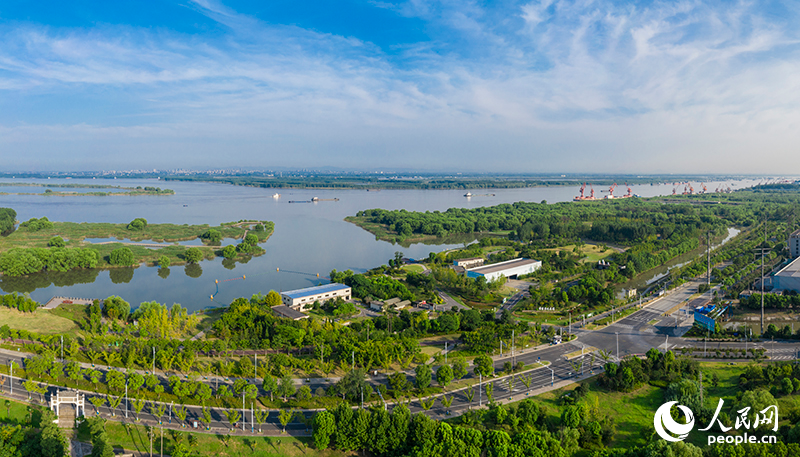
A new picture of the beautiful Yangtze River exhibition. People’s Daily reporter Zhang Jun photo
"Tianmen interrupted the opening of the Chu River, and the clear water flowed eastward." The Yangtze River, with its vast soup, rushed to the sea, washed away Tianmen Mountain, and brought a new atmosphere: the shore was green, the water was clear, the finless porpoise came back, and the industry was rejuvenated.
The protection and development of the Yangtze River is a long-term concern of the Supreme Leader General Secretary. Since the 18th National Congress of the Communist Party of China, General Secretary of the Supreme Leader has held four symposiums in Chongqing, Wuhan, Nanjing and Nanchang, aiming at promoting the development of the Yangtze River Economic Belt.
On August 19, 2020, General Secretary of the Supreme Leader stressed during his investigation in Maanshan City, Anhui Province that the construction of the Yangtze River Economic Belt should be jointly protected and not developed. It is necessary to enhance the awareness of caring for and protecting the Yangtze River, realize a virtuous circle of "people protect the Yangtze River and the Yangtze River benefits the people", and reproduce the scenic spot of "one river with clear water flowing eastward" as soon as possible.
Active actions are taken everywhere.
Hubei signed inter-provincial river basin ecological compensation agreements with three neighboring provinces and cities, 100,000 fishermen in Poyang Lake, Jiangxi Province were taken back to shore to change jobs, and Maanshan, Anhui Province set August 19th as an exclusive festival to protect the Yangtze River …
Nowadays, in the Yangtze River Economic Belt, a new story about protecting the mother river is being written every day.
High level protection
After the flood season, Xuejiawa in Maanshan resumed its former hustle and bustle. Looking from the railing, the sun shines lightly on the river, people and water depend on each other, and the city and water blend together, giving a panoramic view of an ecological picture with clear water and green shore.
It is hard to imagine that a few years ago, there were also illegal docks, yards and "messy" enterprises. In 2019, Ma ‘anshan took Xuejiawa as the breakthrough point, promoting the comprehensive improvement and ecological restoration of the 79-kilometer coastline on both sides of the Yangtze River, demolishing illegal buildings, vacating beaches, and planting trees for greening … After a combination of boxing, Xuejiawa was reborn and ushered in a new life.
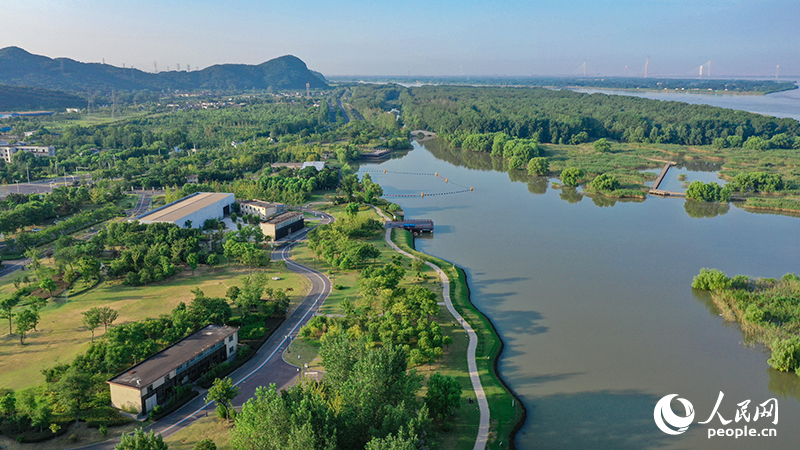
Overlooking Xuejiawa in Maanshan. People’s Daily reporter Zhang Jun photo
Since the implementation of the development strategy of the Yangtze River Economic Belt, it is not uncommon to realize the story of "ecological butterfly change" along the Yangtze River such as Xuejiawa.
Guiyang, the capital of summer vacation, once saw a sharp increase in sewage discharge due to the rapid advancement of industrialization and urbanization. The water quality of Nanming River, an important tributary of the Yangtze River, was once labeled as inferior to V, and the call for "rescue" was endless.
The local authorities learned from this painful experience, implemented industrial "returning from the city to the garden", eliminated the "black and odorous water body" in the river basin, and built reclaimed water plants. After a series of comprehensive management of water environment, the water quality of Nanming River has reached Grade IV or above, and the urban rivers have basically achieved long-term stability. In 2023, Nanming River was also rated as a beautiful and happy river and lake in Guizhou Province, and was selected as an excellent case of beautiful rivers and lakes in the Ministry of Ecology and Environment.
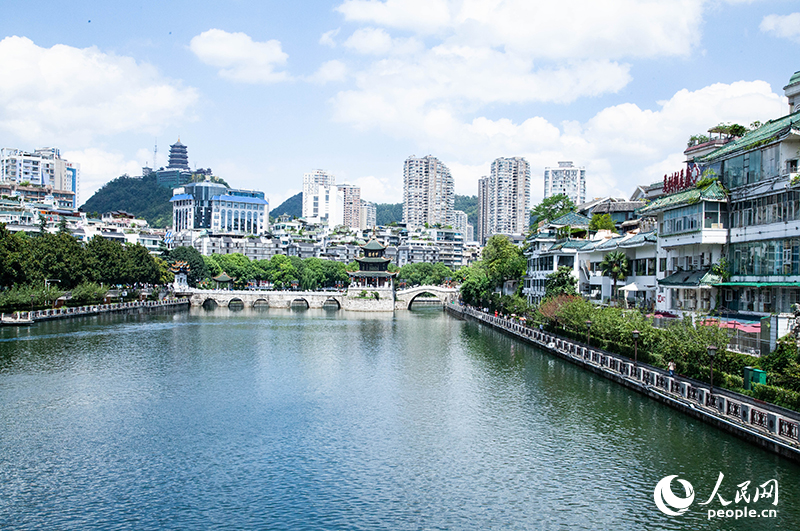
Under the sunshine, the Nanming River is rippling. People’s Daily reporter Wang Xiufang photo
As one of the eight deep-water ports in the Yangtze River, Chenglingji Port in Hunan Province was opened as early as 1899. In 2016, the development and protection of the Yangtze River entered a new era. This century-old port was broken down and established, ushered in transformation and rebirth. Nowadays, the first "capsule" fully enclosed bulk bin in the Yangtze River Basin has completely solved the environmental pollution problems such as dust and sewage, and has become a new landmark of Chenglingji Port.
Chishui River, which originated in Zhaotong City, Yunnan Province, is of special significance for building an ecological security barrier in the upper reaches of the Yangtze River. In recent years, Zhaotong City has taken the road of ecological priority and green development, dismantled dams and small hydropower stations, closed coal mine sand and gravel yards, implemented ecological restoration of river basins, realized the transformation from point to surface and from water to shore, and protected a clear river from Yunnan. The fish species in Chishui River Basin (Yunnan section) increased from 36 species in 2020 to 43 species now.
In Chongming Island, Shanghai, "rare guests" such as river knives and finless porpoises frequently appear; In Xinjizhou, Jiangsu Province, the sight of fish in shallow water surprises tourists; In Xiangfudang, Zhejiang Province, 48 species of wild birds come here for wintering and breeding every year …
These are the best witness to the ecological improvement of the Yangtze River and the restoration of water functions.
High-quality development
Promote high-quality development with high-level protection and activate new kinetic energy for development with the practice of ecological civilization.
In Nantong Development Zone, "chemical encircling the river" was once a "stubborn disease". In 2021, Nantong Development Zone started the "Space Reengineering", anchoring the "3+1" industrial direction of a new generation of information technology, high-end equipment, medical health and new energy, and projects with high gold content came one after another.
Jiangnan Intelligent Manufacturing Industrial Park, located in Zhangjiagang, Suzhou, was formerly Dongsha Chemical Industry Park. After the closure of the whole system in 2017, more than 2,400 mu of industrial land was vacated, and industries such as intelligent manufacturing and new materials were vigorously developed. The average investment per mu increased by about 4 times.
The change of Jiangsu is the epitome of the transformation of old and new kinetic energy in the Yangtze River.
General Secretary of the Supreme Leader stressed, "Under the new situation, the key to promoting the development of the Yangtze River Economic Belt is to correctly grasp the overall promotion and key breakthroughs, ecological environment protection and economic development, overall planning and long-term success, breaking old kinetic energy and cultivating new kinetic energy, self-development and coordinated development, adhere to the new development concept, adhere to the general tone of striving for progress while maintaining stability, and strengthen reform and innovation, strategic planning and guidance, so as to make the Yangtze River Economic Belt a new force leading the high-quality development of China’s economy."
The key to high-quality development lies in innovation.
On the banks of Poyang Lake and at the foot of Lushan Mountain, there are towering towers and criss-crossing pipelines, lush trees and seasonal flowers on both sides of the road, which makes it difficult to connect it with traditional petrochemical enterprises. In the water ecological scenic spot of Bandove Garden in Jiujiang Petrochemical Company, the production and emission data of enterprises are displayed on the electronic screen in real time. "Not only is the water quality monitoring intelligent, but also the long-distance emergency cut-off valve has been installed in the oil pipeline of the terminal to prevent a drop of oil and excessive sewage from flowing into the Yangtze River." Hu Rongjiang, deputy chief engineer of Jiujiang Petrochemical Storage and Transportation Operation Department, said.
With green content, there must be gold content.
In 2022, on the basis of independent research and development, Jiujiang Petrochemical’s 890,000-ton/year aromatics combined plant was successfully started at one time, completely ending the history that China’s aromatic core technology had to rely on foreign introduction.
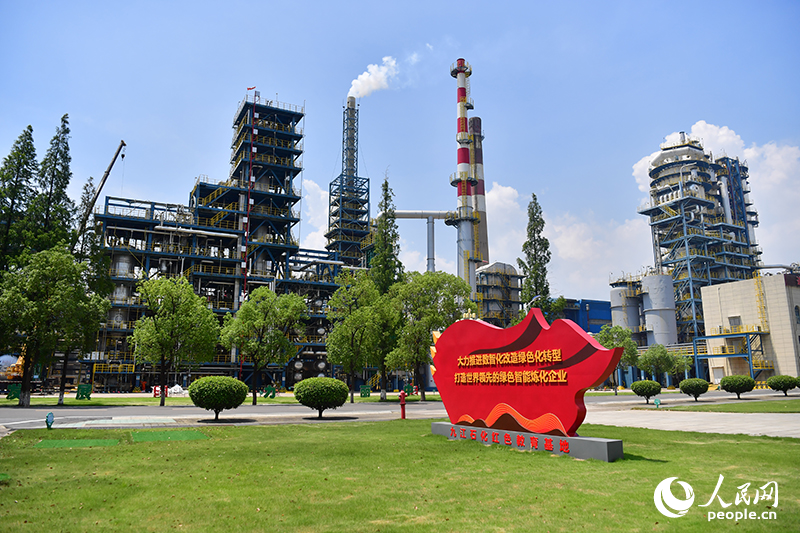
Jiujiang petrochemical production plant. People’s Daily reporter Shi Yushe
In Sichuan, tens of billions of industrial clusters set sail from the Lingang area in southern Sichuan; In Anhui, the "new three" products have gone from Wuhu Yangtze River Smart Port to the world; In Hunan, exquisite bamboo products are exported to the world from Yiyang’s "sleeping" mine …
Looking at the Yangtze River, the background color of green water and green mountains is getting brighter and brighter, and the color of "Jinshan Yinshan" is getting more and more complete.
High quality life
Xiazhong Village, Wuling Town, Wanzhou District, Chongqing, is close to the Yangtze River. At present, it is the tourist season in the village. Along the way, waterfalls, deep pools, strange rocks and jungles are full of good scenery, which brings "good Qian Jing". A river with clear water has made the village beautiful and enriched the people-"After the introduction of tourism projects, the collective income of the village has increased several times. Last year, the number of visitors alone exceeded 150,000." In the words of Chen Shulin, the village party secretary, it is "very comfortable and comfortable!"

In Wuling Town, Wanzhou District, Chongqing, tourists enjoy summer fun. Photo by Yahui Huang
Because of the great protection of the Yangtze River, not only coastal villages, but also people’s lives have changed.
Since she married a fisherman, Chen Lanxiang, a "three girls" in Maanshan, has been living on a boat, living a life of "eating by the river": going out to fish in the early morning and going ashore to sell fish in the early morning.
In 2019, Maanshan City fully started the fishermen’s retreat to change production, and more than 10,000 fishermen including Chen Lanxiang in the city completed landing. After landing, Chen Lanxiang got a subsidy for dismantling fishing boats, lived in a resettlement house, and with the help of the local government, she started a labor service company named "Three Girls" in partnership, from a fisherman in the past to a broker today.
"Since the establishment of the company, the business scope has expanded year by year. Last year, the revenue reached 1.85 million yuan. When the business volume came up, the income increased, and the fishermen’s dividends were guaranteed. In three years, the accumulated dividend was 480,000 yuan." When it comes to the development of the company, Chen Lanxiang is really happy.
Cities thrive on water. People love and protect the Yangtze River, but at the same time, they also reap the gifts from the Yangtze River.
In Badong County, Hubei Province, "Mountain City Green Lung" is back. With the launch of children’s parks and hydrophilic squares, watching river fish, blowing river breeze and running trails have become a new fashion for Badong people to be hydrophilic and green.
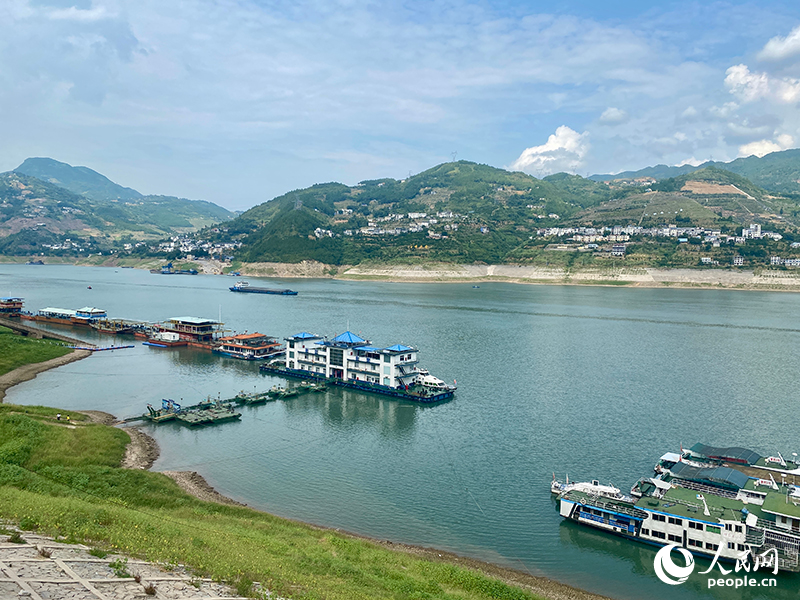
After treatment, the bank of Badong River in Hubei Province. People’s Daily reporter Zhang Peishe
Strolling through the Jiujiang urban section of the Yangtze River National Cultural Park, ships come and go on the river, the traffic on the bridge is speeding, and the riverside park built along the river is full of tourists. A picture of "there is a new scene along the river and Shuicheng people are in harmony" comes to mind.
The river keeps flowing and developing.
Spread out the map of China, and sit on the Yangtze River Economic Belt with a population of 2.05 million square kilometers and a total economic output accounting for half of the country. The shore is turning green, the water is getting clear, and the sky is turning blue. A virtuous circle of "people protecting the Yangtze River and benefiting the people" is taking shape, and the scenic spot of "one river with clear water flowing eastward" is reappearing. (Zhang Lei, Wang Ruihua, Zhang Jun, Wang Xiufang, Angelnan, Xu Chenxi, Shi Yu, Xiang Yu, Hu Hong, Zhang Pei, Cai Shujing, Zhao Zule, Fang Peng Yimeng, Tang Xiaoli, Ma Zuopeng)